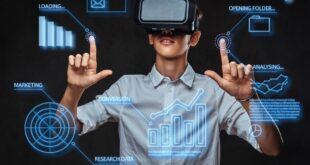Introduction: The AI Journey
Artificial intelligence (AI) has evolved from a speculative concept to a transformative force, reshaping industries and daily life. Its groundbreaking innovations, numerous challenges, and unprecedented achievements have left an indelible mark on various sectors. In this comprehensive guide, we’ll delve into the past, present, and future of AI, exploring its profound impact on healthcare, finance, education, and more. We’ll also share compelling success stories and offer insights on how to harness AI for maximum benefit.
Defining Artificial Intelligence
What is AI?
Artificial intelligence refers to the simulation of human intelligence in machines programmed to think and learn like humans. Artificial intelligence encompasses various subfields, including machine learning, natural language processing (NLP), computer vision, and robotics. These technologies enable machines to perform tasks that typically require human intelligence, such as recognizing speech, making decisions, and translating languages.
Subfields of AI
- Machine learning (ML): is about developing algorithms that allow computers to learn from and make predictions based on data.
- Natural Language Processing (NLP): Enables machines to understand, interpret, and generate human language.
- Computer Vision: Allows machines to interpret and process visual information from around the world.
- Robotics involves designing and programming robots to perform tasks autonomously.
The History of AI: From Its Inception to Now
Rule-Based Systems: Early Days
In the early stages of AI, rule-based systems were dominant. These systems relied on predefined rules and logical reasoning to solve problems in specific domains. One notable example is the Dendral expert system, developed in the 1960s, which assisted chemists in analyzing mass spectrometry data to identify organic compounds.
The rise of machine learning
The advent of machine learning marked a significant shift in AI. Unlike rule-based systems, machine learning algorithms could learn from data and improve over time. One compelling example is Netflix’s recommendation engine, which analyzes user preferences and behavior to suggest personalized movie and TV show recommendations.
The Emergence of Deep Learning
Deep learning, a subset of machine learning, has catalyzed breakthroughs in areas like computer vision and NLP. Google’s DeepMind created AlphaGo, an AI program that defeated world champion Go player Lee Sedol in 2016. AlphaGo’s success relied on deep neural networks trained on vast amounts of gameplay data, showcasing AI’s ability to master complex tasks through self-learning and pattern recognition.
The Present State of Artificial Intelligence: Real-World Applications and Impact
Healthcare

Artificial intelligence is revolutionizing healthcare by enhancing diagnostic accuracy, treatment efficacy, and patient care. IBM Watson Health, for instance, applies AI algorithms to analyze medical imaging data, aiding radiologists in detecting anomalies and diagnosing diseases like cancer. By leveraging AI’s pattern recognition capabilities, Watson Health accelerates diagnosis and improves patient outcomes, showcasing the practical applications of AI in addressing real-world challenges.
Finance
AI is transforming the financial sector by automating tasks, improving decision-making, and enhancing security. PayPal uses AI for fraud detection, automatically identifying and flagging suspicious transactions, significantly reducing losses, and showcasing AI’s role in financial security.
Education
AI-powered platforms like Duolingo are democratizing education by providing personalized learning experiences. Duolingo uses AI to tailor language lessons to individual users, making learning more effective and accessible worldwide.
Success Stories: AI in Healthcare, Finance, and Education
IBM Watson in Healthcare
IBM Watson has transformed healthcare with its ability to analyze and interpret vast amounts of medical data. Watson’s AI algorithms assist doctors in diagnosing complex medical conditions, leading to more accurate diagnoses and personalized treatment plans. For instance, Watson has been instrumental in oncology, helping oncologists develop tailored treatment strategies for cancer patients by analyzing clinical trials and medical literature.
PayPal’s AI-Driven Fraud Detection
PayPal employs AI to enhance financial security by detecting fraudulent activities. Machine learning algorithms analyze transaction patterns and user behavior to identify suspicious activities in real-time. This proactive approach has significantly reduced fraud losses and improved customer trust, demonstrating AI’s potential for financial security.
Duolingo’s personalized language learning
Duolingo leverages Artificial intelligence to create personalized language learning paths for its users. The platform adapts lessons based on individual progress and learning styles, making language education more accessible and effective. Duolingo’s AI-driven approach has empowered millions to learn new languages at their own pace.
The Future of Artificial Intelligence: Predictions and Scenarios
Artificial intelligence and Quantum computing

Quantum computing holds the potential to revolutionize AI by solving complex problems that are currently infeasible with classical computers. Companies like NASA and Google are pioneering efforts to develop quantum computers capable of tackling challenges in optimization, cryptography, and material science. The integration of AI and quantum computing could lead to unprecedented advancements in various fields, opening up a world of possibilities for the future of AI.
Ethical AI and Transparency
As Artificial intelligence becomes more pervasive, it is crucial to ensure ethical considerations and transparency in AI development and deployment. Future AI systems will likely incorporate ethical frameworks to mitigate biases and ensure fairness. Additionally, transparency in AI decision-making processes will be essential to building trust and accountability.
Overcoming challenges: ethical considerations and biases in AI
Addressing algorithmic biases
AI systems can inadvertently perpetuate biases present in training data. To overcome this challenge, organizations must implement rigorous testing and validation procedures to identify and mitigate biases. For example, Google’s AI principles emphasize fairness and inclusivity, guiding the development of unbiased AI technologies.
Ensuring data privacy
Data privacy is a critical concern in AI applications. Organizations must adopt robust data protection measures to safeguard user information. The implementation of regulations like the General Data Protection Regulation (GDPR) in the European Union underscores the importance of data privacy in Artificial intelligence.
Methods for Achieving AI Success
Data Quality and Quantity
High-quality data is the foundation of successful AI projects. Organizations must invest in data collection, cleaning, and preprocessing to ensure accuracy and reliability. Netflix’s extensive data collection on user preferences and viewing habits exemplifies the importance of quality data in delivering accurate recommendations.
Continuous learning and improvement
AI systems must continuously learn and adapt to remain effective. Amazon’s use of Artificial intelligence in its fulfillment centers showcases the value of ongoing learning in optimizing operations. Continuous improvement ensures that AI systems stay relevant and competitive.
Collaboration and innovation
Collaboration between organizations and experts is not just beneficial; it is crucial to driving AI innovation. NASA’s partnership with Google to develop quantum computing solutions is a testament to the power of collaboration in advancing AI technology. Combining expertise from different domains fosters creativity and accelerates progress.
Ethical Frameworks and Transparency
Implementing ethical guidelines and ensuring transparency in AI development are essential for building trust. Google’s establishment of an external AI ethics board exemplifies its commitment to ethical AI practices. Transparent decision-making processes enhance accountability and mitigate risks.
Case Studies: How Companies Achieved Success with AI Implementation
GE Healthcare
GE Healthcare uses Artificial intelligence to analyze medical images, improving diagnostic accuracy and patient outcomes. By accumulating a vast dataset of medical images, GE Healthcare has trained AI algorithms to detect anomalies with high precision. This approach enhances the efficiency of radiologists and accelerates the diagnostic process.
Stitch Fix
Stitch Fix combines AI algorithms with human stylists to provide personalized clothing recommendations. The AI analyzes customer preferences and feedback to curate clothing selections, while human stylists add a personal touch. This synergy of technology and human expertise ensures customer satisfaction and loyalty.
OpenAI
OpenAI employs reinforcement learning techniques to train robotic systems for complex tasks. Through trial-and-error interactions with their environment, robots learn to perform functions like grasping objects and navigating spaces autonomously. OpenAI’s approach showcases the potential of reinforcement learning in advancing automation and robotics.
Emerging Technologies: The Role of Quantum Computing and Artificial Intelligence
Quantum Computing’s Potential
Quantum computing has the potential to tackle complex problems that classical computers struggle to solve. Leveraging quantum mechanics, quantum computers can perform calculations at unprecedented speeds. We expect this capability to revolutionize fields like cryptography, optimization, and drug discovery.
Integrating Artificial intelligence and Quantum Computing
The integration of Artificial intelligence and quantum computing could lead to groundbreaking advancements. Quantum computers can enhance AI algorithms by efficiently processing massive datasets and solving complex optimization problems. This synergy holds the promise of transforming industries and solving global challenges.
Conclusion: AI’s Ongoing Evolution and Implications
The evolution of AI is a testament to human ingenuity and the relentless pursuit of innovation. From its inception to the present, AI has transformed industries, improved lives, and opened new frontiers of possibility. As we look to the future, AI’s potential remains boundless, promising to shape the world in ways we can only imagine.
Call to Action: Embracing Artificial Intelligence for a Better Tomorrow
Embracing Artificial intelligence is not just about adopting new technologies; it’s about fostering a mindset of innovation, collaboration, and ethical responsibility. As AI continues to evolve, it offers unprecedented opportunities to enhance efficiency, solve complex problems, and create a better future for all.
Are you ready to be part of the AI revolution? Explore the possibilities and start your journey toward AI success today.
Frequently Asked Questions (FAQs)
How can we address algorithmic bias?
Algorithmic bias occurs when AI systems make prejudiced decisions based on flawed training data. To address this, organizations can implement rigorous testing and validation procedures and follow ethical guidelines to ensure fairness and inclusivity.
Why is data privacy important in AI applications?
Data privacy is crucial to protect users’ personal information from unauthorized access and misuse. Robust data protection measures and adherence to regulations like GDPR are necessary to safeguard user data and maintain trust.
What is the relationship between the impact of data quality and AI success?
Accurate and trustworthy AI outputs depend on high-quality data. Investing in preprocessing, cleaning, and data collection guarantees the data’s integrity and produces more efficient AI solutions.
In Artificial intelligence, what is continuous learning, and why is it crucial?
The term “continuous learning” describes the capacity of AI systems to change and advance over time. It is significant because it facilitates the continued relevance of AI systems, performance optimization, and the handling of changing opportunities and challenges.
How does collaboration drive AI innovation?
Collaboration between organizations and experts from different fields fosters creativity and accelerates progress. NASA’s partnership with Google demonstrates the effective development of innovative AI solutions by combining diverse expertise.
What are ethical frameworks, and how do they enhance AI development?
Ethical frameworks guide the development of AI technologies to ensure they are fair, transparent, and accountable. They build trust among users and mitigate risks associated with AI decision-making processes.
Can you provide an example of a successful AI implementation in healthcare?
GE Healthcare employs AI to analyze medical images, enhancing diagnostic accuracy and patient outcomes. Their AI algorithms, trained on a large dataset of medical images, help radiologists detect anomalies with high precision.
How does Stitch Fix use AI and human expertise to provide personalized recommendations?
Stitch Fix combines AI algorithms with human stylists to analyze customer preferences and curate tailored clothing selections. This blend of technology and human input ensures personalized recommendations and customer satisfaction.
What is quantum computing’s potential in relation to Artificial intelligence?
Quantum computing can revolutionize AI by solving complex problems and processing massive datasets more efficiently. The synergy between Artificial intelligence and quantum computing holds the potential to drive significant advancements across various industries.
How can individuals and organizations prepare for the AI revolution?
Embracing AI involves adopting new technologies, fostering a culture of innovation, and adhering to ethical principles. By exploring AI possibilities and understanding its impact, individuals and organizations can position themselves for success in the evolving AI landscape.
 Touch Blog
Touch Blog

